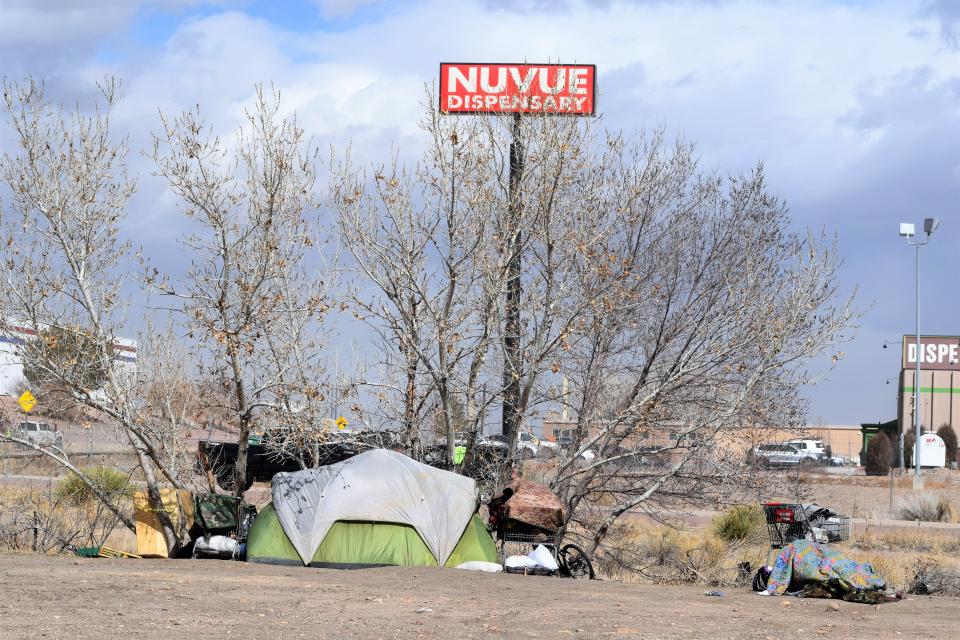One month after Pueblo camping ban, impact and enforcement of new law remain unclear
It’s been more than a month since Pueblo passed a camping ban that makes it illegal to camp on public property within city limits, but the overall impact the law will have on people who are unhoused and how police will enforce it is still unclear.
The ordinance, approved last month, stipulates that a person can’t camp on city property. If they do, they have the option to move into “sheltered space” or face a fine of up to $1,000 if they refuse.
However, a person can’t violate the ban if they can’t access other shelter options. The Pueblo Police Department must first demonstrate that the person has other alternatives before they can cite them for breaking the new law, said Carla Sikes, Pueblo's city attorney.

The ordinance doesn't specify what kinds of shelters to which unhoused individuals would need access in order to avoid violating the ban. Theoretically, the shelter could be Posada of Pueblo, or Crazy Faith Street Ministry, which opened an overnight emergency warming shelter in January. The Pueblo Rescue Mission is another option, provided it has enough staff on hand to accommodate an increase in clients.
Some of those shelter options, however, are temporary. Many of Pueblo’s unhoused create encampments that contain most of their belongings, which can make a sudden transition difficult.
Others may be reluctant to leave a place they’ve called home for a prolonged time, some Pueblo homeless advocates say, which may subject them to fines that they likely cannot pay.
“They’ve been doing it for so long, freely, that change is hard,” said Tammy Kainz, co-operator of Crazy Faith Street Ministry. “I’m not vouching for them, but if they’ve been doing this for so many years, to expect change overnight — it’s not going to happen.”
The Chieftain sought comment from Pueblo PD about how the law is being enforced and whether anyone has been cited since its passage, but did not receive a response prior to Friday’s print deadline.
Camping bans are often criticized by homeless advocates, some of whom argue they don’t address homelessness and make outreach and engagement with the unhoused more difficult. Pueblo City Councilor Regina Maestri, who introduced the ordinance, claimed it had nothing to do with homelessness but rather was a way to protect Pueblo’s environment.
Uncertainty looms over shelter options
Last month, Mayor Heather Graham invited homeless advocates and community organizations to a meeting in response to the camping ban. The meeting served as an early discussion between Graham and those stakeholders on how Pueblo could better help the unhoused, but Graham shared concerns over the law’s monetary penalty and potential impact.
Those concerns grew in recent weeks after the city learned the Pueblo Rescue Mission hadn’t sheltered anyone at its new facility in months because of collapsed sewer lines. Graham said she sensed city council, during its vote on the camping ban, likely assumed the shelter had its new space as an option to house incoming clients who are told to go there or face the fine.
Melanie Rapier, executive director of the Pueblo Rescue Mission, has previously said that capacity at the shelter depends on staffing levels.
It’s unclear if the rescue mission, Pueblo’s only full-time homeless shelter, has room at its Fourth Street facility to bring those people in, fueling uncertainty as to whether it’s a feasible option under the law’s definition of “sheltered space.”
Rapier did not respond to a request for comment from the Chieftain.
“I foresee it being an issue when it happens, because there isn’t the additional space now,” Graham said.
Unpredictability of shelter options, threat of fines creates fear among unhoused
Paul Montoya, a Pueblo homeless advocate, frequents the encampments that many of Pueblo’s unhoused call home. He said that uncertainty and fear among those individuals have grown since the ban passed, particularly because of the potential fine and because they don’t know where to go.
Kainz and Montoya said things could get tricky for people who are asked to stop camping and told to move to an available shelter. It may be difficult for them to bring all their belongings, and because some shelter options are temporary, it's unclear where they might shelter the next day and the weeks thereafter.
But once an unhoused person accesses shelter, it could serve as a gateway for them to escape homelessness. Kainz estimates that Crazy Faith helps at least 20 people each winter get back on their feet after they receive shelter.
“These people have been through tough times, so they need a lot of love,” Kainz said.
“Their hearts have been broken, their families have been broken. So, they need someone who’s going to work with them and give them compassion.”
More Pueblo news: Pueblo organizations get millions in state grant funds for workforce training
Chieftain reporter Josué Perez can be reached at JHPerez@gannett.com. Follow him on X, formerly Twitter, at @josuepwrites. Support local news, subscribe to The Pueblo Chieftain at subscribe.chieftain.com.
This article originally appeared on The Pueblo Chieftain: What impact is Pueblo's camping ban having on homeless people?

